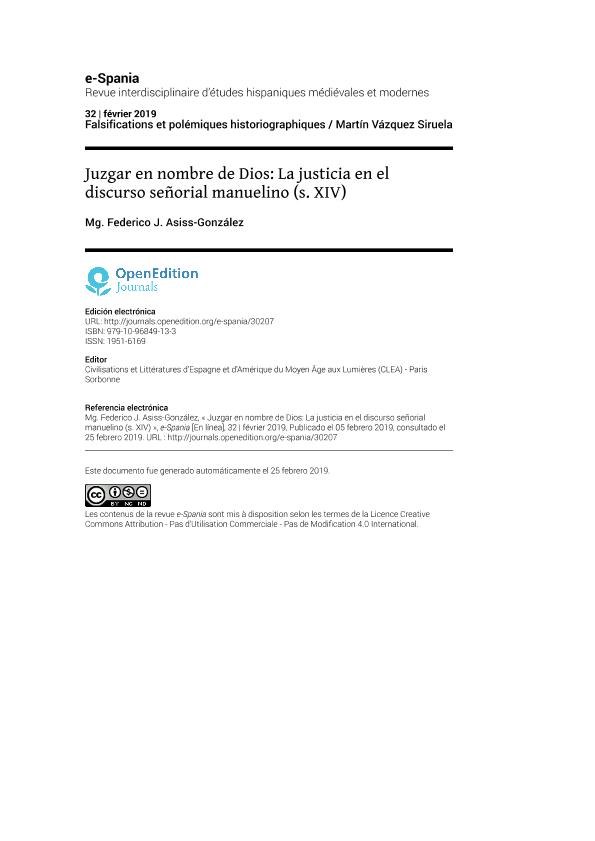Mostrar el registro sencillo del ítem
dc.contributor.author
Asiss González, Federico Javier

dc.date.available
2020-11-11T19:34:24Z
dc.date.issued
2019-02
dc.identifier.citation
Asiss González, Federico Javier; Juzgar en nombre de Dios: La justicia en el discurso señorial manuelino (s. XIV); Université Paris-IV Sorbonne; e-Spania; 32; 2-2019; 1-14
dc.identifier.issn
1951-6169
dc.identifier.uri
http://hdl.handle.net/11336/118202
dc.description.abstract
El poder punitivo fue el sostén del imperium de emperadores y reyes medievales dado por Dios. Hacer morir y dejar vivir fueron los dos polos en lo que se expresaba, a través de la Justicia, la voluntad y el poder monárquico. Don Juan Manuel, sabiendo esto, fija una clara y controversial teoría sobre la Justicia en la que el saber, la divinidad y el poder se entrelazan. Asimismo, de manera indirecta, sienta las bases de una teoría del ejercicio del poder distinta de la argumentada por los teóricos políticos monárquicos y a la estructura del futuro Estado moderno. Sin embargo, este aspecto de su obra no ha sido trabajado por la investigación histórica y literaria con la atención debida, dejando importantes variables sin analizar para comprender mejor el pensamiento del autor. Situación que el actual trabajo busca revertir en parte.
dc.description.abstract
The punitive power was the support of the imperium of emperors and medieval kings given by God. To make die and stop live were both poles in what it was expressing, across the Justice, the will and the monarchic power. Don Juan Manuel, knowing this, fixes a clear and controversial theory on the Justice in which the Knowledge, the Divinity and the Power interlace. Likewise, in an indirect way, he lays the foundations of a theory of the exercise of the power different from the argued one for the theoretical monarchic politicians and to the structure of the future modern State. However, this aspect of his work has not been worn out for the historical and literary research with the due attention, leaving important variables without analyzing to understand better the thought of the author. Situation that the current work seeks to revert partly.
dc.format
application/pdf
dc.language.iso
spa
dc.publisher
Université Paris-IV Sorbonne
dc.rights
info:eu-repo/semantics/openAccess
dc.rights.uri
https://creativecommons.org/licenses/by-nc-nd/2.5/ar/
dc.subject
JUSTICIA
dc.subject
DON JUAN MANUEL
dc.subject
PODER
dc.subject
SABER
dc.subject
REY
dc.subject.classification
Historia

dc.subject.classification
Historia y Arqueología

dc.subject.classification
HUMANIDADES

dc.title
Juzgar en nombre de Dios: La justicia en el discurso señorial manuelino (s. XIV)
dc.type
info:eu-repo/semantics/article
dc.type
info:ar-repo/semantics/artículo
dc.type
info:eu-repo/semantics/publishedVersion
dc.date.updated
2020-11-09T19:28:47Z
dc.journal.number
32
dc.journal.pagination
1-14
dc.journal.pais
Francia

dc.description.fil
Fil: Asiss González, Federico Javier. Universidad Nacional de San Juan. Facultad de Filosofía, Humanidades y Artes. Departamento de Historia; Argentina. Universidad Nacional de Mar del Plata. Facultad de Humanidades; Argentina. Consejo Nacional de Investigaciones Científicas y Técnicas; Argentina
dc.journal.title
e-Spania
dc.relation.alternativeid
info:eu-repo/semantics/altIdentifier/doi/http://dx.doi.org/10.4000/e-spania.30207
dc.relation.alternativeid
info:eu-repo/semantics/altIdentifier/url/https://journals.openedition.org/e-spania/30207
Archivos asociados
